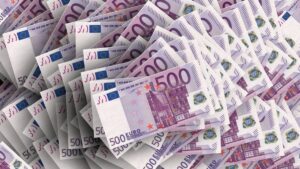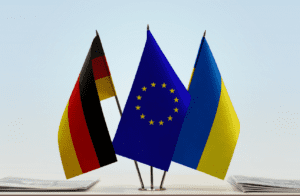
Secretary of State for Development, German government coordinator for international aid to Ukraine Jochen Flasbart, who arrived in Kiev yesterday, agreed on another aid package with Deputy Prime Minister Irina Vereshchuk and Ukrainian Finance Minister Serhiy Marchenko, the German Federal Ministry for Economic Cooperation and Development reported.
According to the report, the development ministry will invest an additional 111 million euros in housing for displaced people and in support for Ukrainian municipalities, such as renovating and equipping kindergartens, schools and hospitals.
“Rebuilding Ukraine will be a gigantic task for the country, its people and for us as an international community. And it is already beginning now, even if, unfortunately, there is no end in sight to the war. This long-term perspective and early planning is important. We want to show the people of Ukraine that we will continue to stand with them in solidarity. And we need to make sure that our short-term support matches the long-term recovery,” the secretary of state said.
He stressed that “this is also about investing in Europe’s future, because a strong economic Ukraine will also be an important pillar of our shared European prosperity.”
Flasbart is in Ukraine from April 18 to 19 as the federal government’s commissioner to coordinate international reconstruction efforts. In addition to talks with the Ukrainian government on expanding bilateral cooperation, the trip includes talks with Ukrainian civil society on strengthening anti-corruption measures and transparency, as well as an exchange of views with Ukrainian entrepreneurs. Flasbart is also holding talks with parliamentarians, the Ukrainian Association of Cities and Municipalities and the United Nations.
According to information, Berlin has provided 3.6 billion euros in civilian support to Ukraine since the start of Russia’s full-scale invasion last February.

German authorities are planning to allocate another EUR12 billion for military support to Ukraine, Bloomberg reported, citing sources on Wednesday.
The Bundestag budget committee is expected to approve the plans of German Defense Minister Boris Pistorius on Wednesday. Thus, in case of approval of such a step, the total amount of funds, directed by Berlin for military aid to Kiev, will increase up to EUR14.2 billion.
In particular, the amount planned for 2023 will more than double and reach EUR5.4 billion. The rest of the funds – EUR8.8 billion – will be available if necessary in the coming years. The money will not come from the Defense Ministry’s budget or the special EUR100 billion fund for the modernization of the Bundeswehr.
In addition, on Wednesday, the Bundestag budget committee is expected to approve the purchase of 10 self-propelled rapid-fire howitzers from Krauss-Maffei Wegmann GmbH & Co KG worth EUR 185 million; these guns are to replace the howitzers transferred by Germany to Ukraine.

German residents were moving more actively around the country on Sunday, many domestic trains were jammed with passengers as people sought to get to their desired destinations before a major strike by transport workers began, Western media reported.
On Monday, March 27, many transport workers, from railroad workers to airport and public transport employees in cities, are expected to take part in a nationwide strike. This strike is expected to halt traffic in the country for a day.
German trade unions have called on thousands of transport workers to take part in the strike and to demand higher wages – to cope with high inflation. Thus, in the trade union Verdi said that they had appealed to go on strike to 120 thousand people and in the EVG union that protects the rights of railway workers in Germany – to 230 thousand people.
The unions are seeking to raise the wages of the transport industry employees by 10-12%, but at the moment, the employers offer a phased increase of 5% and a one-time payment of about EUR2.5 thousand.
Meanwhile, on Sunday, the day before the strike, Munich Airport was already closed, flights were also cancelled or delayed in Germany’s largest airport – Frankfurt am Main Airport.

The total budget of technical assistance projects to be implemented in Ukraine within the framework of the International Climate Initiative will amount to EUR 44.5 million, including both new projects and those planned to be launched before the war or whose work was temporarily suspended with the outbreak of hostilities.
According to the website of the Ministry of Environmental Protection and Natural Resources of Ukraine on Tuesday, such initiatives were discussed in Berlin during the meeting of the Ukrainian delegation headed by Deputy Minister Alexander Krasnolutsky with representatives of the Federal Ministry of Economics and Climate Protection of Germany, the Federal Ministry for the Environment, Nature Conservation, Nuclear Safety and Consumer Protection of Germany, the German Society for International Cooperation (GIZ) and the Secretariat of the German Institute for International Cooperation.
German projects, in particular, will cover support for Ukraine in implementing the Paris Agreement and adaptation to the consequences of climate change in the Black Sea region, establishing an emissions trading system, forming a low emission policy, preserving forests in the Carpathians, and increasing Ukraine’s ability to overcome the consequences of war and integrate into the EU. In addition, they talked about Ukraine’s accession to the climate club, which is now being formed by the European Union.
In addition, the German government is ready to help Ukraine with the construction of rehabilitation centers for animals affected by war, which are envisaged in the plan for the post-war reconstruction of Ukraine.
According to Krasnolutsky, Ukraine is striving to apply the best practices that exist today in Europe for its reconstruction and development.

The German federal government is allocating 5 million euros to support a project to repair war-damaged schools in Ukraine, the United Nations Development Program (UNDP) in Ukraine reports.
“The UNDP-coordinated project will promote sustainability and green recovery through the repair and modernization of damaged educational institutions in war-affected territories as part of the UNDP Resilience and Recovery Programme. The first sites where repairs will be funded were selected from a list of 74 schools located in 12 cities that are in urgent need of repair work. The list was compiled by the Ministry of Education of Ukraine”, – stated in the message.
The financial contribution of the German government will be distributed among 12 schools in five regions – Zaporizhzhia, Mykolayiv, Rivne, Sumy and Chernihiv. Thus, more than 3 thousand students will be able to resume their education.
In the course of repair work, the Eurocode 8 standard, which applies to the design and construction of structures and other construction work in seismic areas, will be applied. There will also be a unified approach to the repair and modernization of existing buildings. The use of hazardous building materials (e.g., asbestos, sealants containing persistent organic pollutants) will be prohibited, the use of environmentally friendly furniture and equipment will be encouraged (e.g., LED lights instead of fluorescent lamps containing mercury). In addition, a key part of the initial design task and part of the requirements for the selection of the design team and developers will be the criteria of architectural accessibility.
“The UNDP team has already begun inspecting each building and assessing specific rehabilitation needs. The accelerated procurement procedure will allow identifying a group of companies to carry out repairs that will be carried out in full compliance with national legislation and Eurocode 8 standards, while respecting Build Back Better principles,” said UNDP Resident Representative in Ukraine Jaco Silje, noting that institutions that have suffered minor or partial damage will be repaired and modernized.
German Ambassador to Ukraine Anka Feldhusen said it is important to invest in Ukraine’s future and in the sustainability of its children and teachers.
“Eventually these children will live in this great country and rebuild it for the better. But they need schools to teach them and teachers to show them the way. We also need to make sure that school buildings are safe places to learn in terms of environmental standards,” she stressed.

Germany has joined an international project to restore Ukrainian cities #UN4Kharkiv-Mykolaiv and allocated EUR5 million.
As it was informed, the UN Economic Commission for Europe (UNECE) has created working groups #UN4Kharkiv and #UN4Mykolaiv and invited international architects to help these cities develop future master plans. The British architect Norman Foster Foundation helps Kharkiv, while the global design and architectural company One Works (Italy) coordinates the work in Nikolaev.
It became known about the German side joining the projects during the online meeting of the working groups, which was attended by representatives of the Ministry of Community Development, Territories and Infrastructure of Ukraine, UNECE, the Federal Ministry of Economic Cooperation and Development of Germany, local governments of Mykolaiv and Kharkiv and other international organizations.
“Since the beginning of Russia’s full-scale aggression, we have been sending the most necessary aid to Ukraine. And at the same time we are thinking about how to support you in rebuilding after the end of the war, because it is necessary to prepare for this now. I personally received a task from the German Federal Chancellor Olaf Scholz to represent our country in this work,” said State Secretary of the Federal Ministry for Economic Cooperation and Development Jochen Flasbart.
He recalled that the G7 countries met last December, during which the member states expressed their understanding that Ukraine needed comprehensive assistance.
Flasbat said that the German Federal Ministry for Economic Cooperation and Development will provide the international project #UN4Kharkiv-Mykolaiv with financial support of EUR5 million.
“We are giving the “green light” and preparing funds so that these projects can be successfully implemented. We hope that the terrible war will end as soon as possible, and we will start rebuilding Ukraine,” Jochen Flasbarth makes plans for the future.